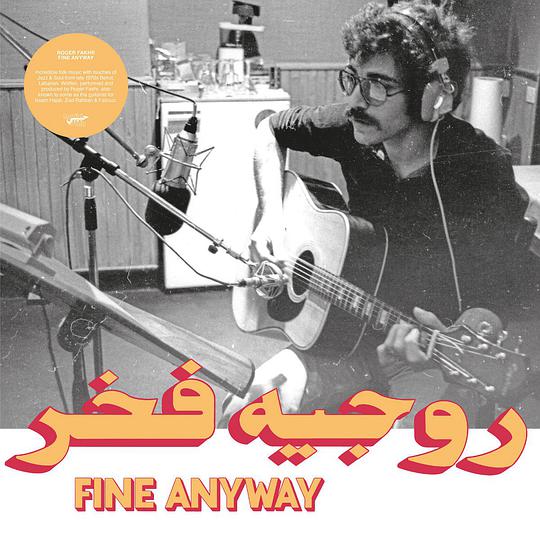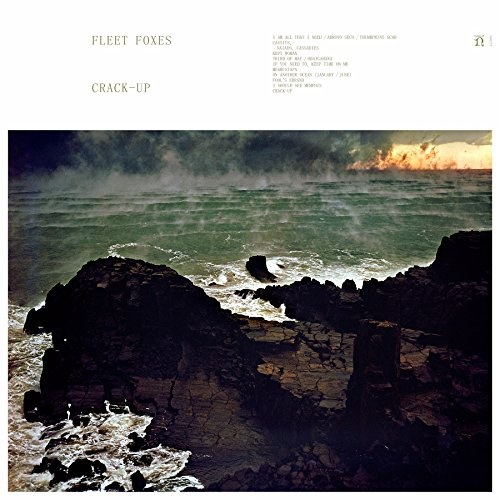Fine Anyway 豆瓣
Rogér Fakhr
类型:
民谣
发布日期 2021年3月5日
出版发行:
Habibi Funk Records
I do not exactly remember when I heard the name Rogér Fakhr for the first time. It must have been around 2 years ago during one of these afternoons I spent at Issam Hajali’s jewelery shop on Mar Elias Street in Beirut. We had started working on the idea of re-releasing some of Issam’s music and he proposed his first album “Mouasalat Ila Jacad El Ard”; recorded before starting his band Ferkat Al Ard. As it happened, Rogér had colaborated with Issam in the process of working on the music and recording. They were both living in Paris for some time after each of them have had left Beirut sometime after 1976.
Whenever Rogér's name came up in conversations, it nearly automatically ended up in a praise of his outstanding musical talents. Right off, it caught my interest because neither had I heard of Rogér Fakhr nor could I find any infos about him on the internet. So Issam recounted how they even used to be flat mates for some time and constantly working on music together. Eventually their collaborations came to an end after Rogér emigrated to the USA. In fact, I got to know he initially was on tour as part of Fairuz's band in the US and just decided to stay there ultimately. At some point, Issam mentioned how he had actually kept some of Rogér’s music on tape in his basement but also he couldn’t play it to me before Rogér would green... light that.
As the story goes, at that period of time a multitude of projects were ongoing and I somehow missed out of inquiring further. Yet Rogér’s name kept on coming up in conversations with musicians of the same generation in Beirut steadily. No matter whether it was Ziad Rahbani, Munir Khauli or anyone else talking about him, every single mention would almost inevitably be followed by a huge praise for his music and approval of his talent.
The disparity between him being so highly appreciated amongst his peers, while somehow simultaneously not being part of the researchable musical history of Lebanon (at least to me!) of the last decades, baffled me and at some point I just asked Issam for Rogér’s contact. After we exchanged some emails and he ended up sending me a selection of music recorded in the late 1970s in Beirut. While some of that material had never seen a release, others were released on his album “Fine Anyway” - back in the time, he had hand copied around 200 cassette copies of that album.
To put it short: I was blown away! The music was a mixture of folk with touches of other genres. Maybe one could also refer to it as “singer-songwriter”, since all of the songs were Roger’s own compositions. Songs of unique beauty both musically as well as lyrically. At the same time they gave me the feeling of them being somehow time and space isolated capsules. Nothing really revealed, where they could’ve been recorded and without knowing it was Beirut, my first guess maybe would have rather been California, sometime in the 1970s. The immersive effect of his compositions and voice are just incredible. I was stunned and proposed Rogér to work on a re-release, which he politely declined, saying he had no interest in this music being reissued.
Fast forward a year or two, Beirut had been rocked by the horrible explosion of it’s port on the 4th of August 2020. We (everybody at the label) were truly shocked and after the initial paralysis had vanished and we managed to check in on friends, whether they are ok or in need of something, thoughts on how to help with the rescue and relief efforts happening locally developed. Not being physically able engage with the support groups on site, we figured it would be the most evident idea to put together a compilation featuring some of the Lebanese musicians we had met and adore such as Ferkat Al Ard, Munir Khauli, Toufic Farroukh and Abboud Saadi in solidarity. We managed finalize the compilation within 24 hours and after we were nearly done I thought why not at least let Rogér know about it. He called me back within an hour, excited to be part of the project. In the meantime, his perspective on the idea of reissuing his music had shifted and he was welcoming the idea to make his music heard by a new generation.
I hope his music will be a revelation to you listening just like it was for us. more
Whenever Rogér's name came up in conversations, it nearly automatically ended up in a praise of his outstanding musical talents. Right off, it caught my interest because neither had I heard of Rogér Fakhr nor could I find any infos about him on the internet. So Issam recounted how they even used to be flat mates for some time and constantly working on music together. Eventually their collaborations came to an end after Rogér emigrated to the USA. In fact, I got to know he initially was on tour as part of Fairuz's band in the US and just decided to stay there ultimately. At some point, Issam mentioned how he had actually kept some of Rogér’s music on tape in his basement but also he couldn’t play it to me before Rogér would green... light that.
As the story goes, at that period of time a multitude of projects were ongoing and I somehow missed out of inquiring further. Yet Rogér’s name kept on coming up in conversations with musicians of the same generation in Beirut steadily. No matter whether it was Ziad Rahbani, Munir Khauli or anyone else talking about him, every single mention would almost inevitably be followed by a huge praise for his music and approval of his talent.
The disparity between him being so highly appreciated amongst his peers, while somehow simultaneously not being part of the researchable musical history of Lebanon (at least to me!) of the last decades, baffled me and at some point I just asked Issam for Rogér’s contact. After we exchanged some emails and he ended up sending me a selection of music recorded in the late 1970s in Beirut. While some of that material had never seen a release, others were released on his album “Fine Anyway” - back in the time, he had hand copied around 200 cassette copies of that album.
To put it short: I was blown away! The music was a mixture of folk with touches of other genres. Maybe one could also refer to it as “singer-songwriter”, since all of the songs were Roger’s own compositions. Songs of unique beauty both musically as well as lyrically. At the same time they gave me the feeling of them being somehow time and space isolated capsules. Nothing really revealed, where they could’ve been recorded and without knowing it was Beirut, my first guess maybe would have rather been California, sometime in the 1970s. The immersive effect of his compositions and voice are just incredible. I was stunned and proposed Rogér to work on a re-release, which he politely declined, saying he had no interest in this music being reissued.
Fast forward a year or two, Beirut had been rocked by the horrible explosion of it’s port on the 4th of August 2020. We (everybody at the label) were truly shocked and after the initial paralysis had vanished and we managed to check in on friends, whether they are ok or in need of something, thoughts on how to help with the rescue and relief efforts happening locally developed. Not being physically able engage with the support groups on site, we figured it would be the most evident idea to put together a compilation featuring some of the Lebanese musicians we had met and adore such as Ferkat Al Ard, Munir Khauli, Toufic Farroukh and Abboud Saadi in solidarity. We managed finalize the compilation within 24 hours and after we were nearly done I thought why not at least let Rogér know about it. He called me back within an hour, excited to be part of the project. In the meantime, his perspective on the idea of reissuing his music had shifted and he was welcoming the idea to make his music heard by a new generation.
I hope his music will be a revelation to you listening just like it was for us. more



